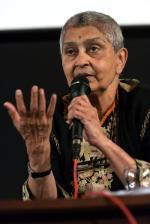Reading List
This section features information on texts on decolonising history which we have been reading and the ones that have been discussed at one of our events.
Aimé Césaire, Discourse on Colonialism (1955)
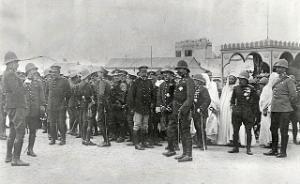
One of the biggest myths of colonialism was that it was a project to ‘civilise’ the colonised peoples. Aimé Césaire, a Martiniquan poet and politician, set out to expose this myth in Discourse on Colonialism. More than this, however, Césaire wanted to show how ‘colonization works to decivilize the colonizer’. For Césaire, the fascism that devastated Europe in the first half of the twentieth century was not a deviation from the march of progress, but rather the ‘boomerang effect’ of colonialism. Discourse on Colonialism is a deeply humanist text, but Césaire believed that ‘the West has never been further from being able to live a true humanism — a humanism made to the measure of the world.’ Césaire’s humanism led him to socialism, and he concluded his essay by declaring that the ‘salvation of Europe’ was ‘a matter of the Revolution — the one which, until such time as there is a classless society, will substitute for the narrow tyranny of a dehumanized bourgeoisie the preponderance of the only class that still has a universal mission, because it suffers in its flesh from all the wrongs of history, from all the universal wrongs: the proletariat.’
Recommendation by Dr Theo Williams
Adom Getachew, Worldmaking after Empire: The Rise and Fall of Self-Determination (2019)

Celebrating Ghanaian independence in March 1957, prime minister Kwame Nkrumah declared that this independence was ‘meaningless unless it is linked up with the total liberation of the African continent.’ In her excellent monograph, Adom Getachew convincingly argues that African and diasporic anticolonial leaders did not simply appropriate a Wilsonian idea of self-determination. They were instead engaged in a project of worldmaking that would reinvent self-determination; ‘decolonization was a project of reordering the world that sought to create a domination-free and egalitarian international order.’ Importantly, ‘anticolonial self-determination always included economic as well as political independence.’ With this in mind, African and diasporic intellectuals and politicians embarked on several projects in the postwar period — institutionalising the right to self-determination at the United Nations, forming regional federations, and demanding a New International Economic Order — in order to secure a clean break from the imperialist world system, which nation-building alone could not provide. These worldmaking projects were often unsuccessful. Getachew opines that the period since the mid-1970s has been marked by the triumph of neoliberalism over self-determination. Nevertheless, her book is a powerful contribution to conversations about what exactly decolonisation means.
Recommendation by Dr Theo Williams
C. L. R. James, The Black Jacobins: Toussaint L'Ouverture and the San Domingo Revolution (1938)
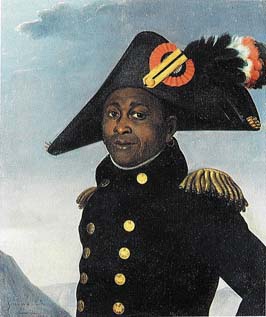
The Black Jacobins is the story of the ‘only successful slave revolt in history’. In 1791, the enslaved people of the French colony of Saint-Domingue rose up against their masters. A complex chain of events followed; there were invasions, insurrections, alliances. Ultimately, the revolt culminated in the abolition of slavery and the expulsion of the French colonial government. The new nation of Haiti was born. The ultimate contribution of The Black Jacobins is to write enslaved peoples and the Haitian Revolution into world history. James showed that the French Revolution and the Haitian Revolution were deeply entangled, and that European history could not be detached from the histories of the colonies. He also noted in his preface that the book contained ‘the fever and the fret’ of his own age. A product of the 1930s, The Black Jacobins was written as James contemplated the Spanish Civil War, the Moscow Show Trials, and the impending Second World War. James stated that ‘the book is the history of a revolution and written under different circumstances it would have been a different but not necessarily a better book.’
Recommendation by Dr Theo Williams
Claudia Jones, An End to the Neglect of the Problems of the Negro Woman! (1949)

Black feminism has been characterised by an alertness to the connections between and intersections of race, gender and class oppression. Claudia Jones’s groundbreaking pamphlet An End to the Neglect of the Problems of the Negro Woman! was one of the earliest systematic analyses of this triple oppression. As she summed up her argument: ‘Negro women — as workers, as Negroes, and as women — are the most oppressed stratum of the whole population.’ Jones was a Trinidadian migrant to the United States and a member of the Communist Party, but she did not shy away from criticising some of her comrades. She challenged ‘the position which sometimes finds certain progressives and Communists fighting on the economic and political issues facing the Negro people, but “drawing the line” when it comes to social intercourse or inter-marriage.’ Here Jones preempted another major tenet of later feminist movements: the idea that the personal is political. Jones believed that Black women should be at the forefront of revolutionary politics, and An End to the Neglect of the Problems of the Negro Woman! stands as both a serious piece of political analysis and an urgent call to action.
Recommendation by Dr Theo Williams
Claire Mansour, ‘The Cross-National Diffusion of the American Civil Rights Movement: The Example of the Bristol Bus Boycott of 1963’, Miranda, Vol. 10 (2014)

Mansour’s article looks at how the Montgomery bus boycott (1955-56) influenced the Bristol bus boycott (1963) in a process of ‘cross-national diffusion’. It is compelling partially for its account of the largely unknown Bristol boycott, a compelling and powerful example of racial discrimination within British employment law. Mansour looks at how the events in Bristol were inspired and modelled on the events in Montgomery, but adapted to better suit the particular British context in order to help fulfil their aims. This article is highly compelling, largely due to its links to contemporary events, specifically the BLM movement, which underwent a similar process of cross-national diffusion from the US to Britain. The theoretical and sociological foundation set out in the article offers an interesting way of making sense of how cross-national movements can spread, and why they find powerful inspiration in some places, and not in others. Mansour’s short article is well-worth reading, both for an insight into a fascinating example of a successful British race protest, and to better understand the contemporary spread of cross-national ideas.
Recommendation by Ben Thomas
Amanda Behm, Christienna Fryar, Emma Hunter, Elisabeth Leake, Su Lin Lewis and Sarah Miller-Davenport, ‘History on the Line - Decolonizing History: Enquiry and Practice’ History Workshop Journal, Volume 89, Spring 2020, Pages 169–191.
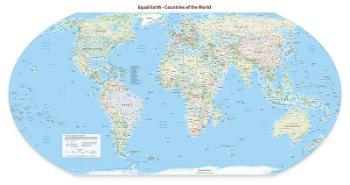
The article engages with the questions “how does ‘decolonizing history’ relate to the study of decolonization? And can history, as a field of practice and study, be ‘decolonized’ without considering histories of empire?” Six historians grapple with the implication of ‘decolonising history’ for the discipline of history, day-to-day teaching and research, in general. They also want to use the decolonising framework to globalise issues of ‘race, ethnicity and gender’. ‘Decolonising History’ thereby encapsulates a vast range of topics, fields and discourses. Diversifying reading lists, expanding the use of languages in historical research, integrating area studies approaches into historical scholarship and moving beyond Eurocentric histories are some of the programmatic points. However, they go further and propose inquiries into our understanding of the archives, why and how they were built, what they include and exclude – one mainstay of postcolonial scholarship. They suggest putting together conceptual instruments that can help historians to become sensitized to a ‘constant critical perspective’ and to pursue ‘more sustained engagements with constructed categories of social difference’. This also entails exploring what ‘decolonising’ means before ‘colonialism’. To globalise the drive to decolonise also means to historicise what it means and to investigate categories of social difference in earlier periods. How did they become folded into processes of colonisation? How do structures of political, social and cultural dominance express themselves in the medieval and early modern periods?
Recommendation by Dr Chris Bahl
Temi Odumosu, 'The Crying Child: On Colonial Archives, Digitization, and Ethics of Care in the Cultural Commons,' Current Anthropology, Volume 61, Number S22.
-154x166.jpg)
The best thing I’ve read this past year is Temi Odumosu’s article ‘The crying child’, in a special issue of the journal Current Anthropology devoted to Atlantic slavery and its impact on the modern world. Temi is an art historian at Mälmo University, and in this article, she considers the ‘ethics of care’ in dealing with digitized photographic materials that derive – as so many photographs do – from colonial contexts of production, circulation, and social relationships. The photograph of an Afro-Caribbean toddler, engulfed in tears, was taken on St Croix and is now in the Royal Danish Library. As museums, libraries, and heritage institutions make their photograph collections available in the digital commons, what responsibilities do we have in shaping digital encounters with images, like this one, that encapsulate analogue encounters of enslavement or coercion, of inequality or neglect? Dr Odumosu reflects on the experience of working with painful material in archives and argues for a stronger ethos of care and curatorship when bringing such images into the public sphere. Reading this made me question some of my own past choices in publishing or displaying certain photographs. It’s an article that will definitely shape my future teaching and research.
Recommendation by Prof. Christina Riggs
John Dagenais and Margaret Greer, ‘Decolonizing the Middle Ages: Introduction’, Journal of Medieval and Early Modern Studies 30.3 (2000), pp. 431-448.

Dagenais and Greer’s introduction to a special ‘Decolonizing the Middle ages’ issue of the JMEMS places medieval history in conversation with postcolonial and decolonization theory, exploring their interactions. They use Petrarch’s writings as an entry point, writing as he does at the moment of the first constructions of the Middle Ages as a separate ‘Dark Ages’ and the beginning of colonialist exploration of the ‘Dark Continent’. They unpick how he constructs both the Middle Ages and Africa as Other, barbaric, and fixed in some separate time, emphasising the how these overlapping discourses of historical and geographical colonialism reinforce each other. They identify the imposition of Modernist historical discourses and the focus on French and English experience in Medieval Studies as a ‘colonizing’ process, just as postcolonial theory is itself often dominated by Western academic experience. They highlight how medieval history has been used to justify colonial endeavours, such as in Australia. For Dagenais and Greer, medieval studies has much to teach about colonization: it is itself deeply implicated in the history of colonialism and thus provides an opportunity to see the process of colonization at work, and allows us to examine the long history of colonial narratives.
Recommendation by Emilie Tenbroek
Julian Go, ‘The imperial origins of american policing: militarization and imperial feedback in the early 20th century’, American Journal of Sociology 125.5 (2020), pp. 1193-1254.

Go applies the concept of ‘imperial feedback’ to the history of the US mass incarceration crisis, suggesting that the militarization of the US police force in the early 20th century cannot be separated from US imperialism. He suggests that American colonial activity in places like Puerto Rico and the Philippines led to the centralization and professionalization of the military and invention of new tactics, which in turn led to the adoption of these techniques by the police and therefore its ‘militarization’. Produced and refined in the imperial periphery to control colonized peoples, these techniques were imported by ‘imperial actors’, from veterans to police officials simply interested in imperial activity. Go posits that these actors constructed analogies between the periphery and centre: certain domestic populations were also racialized as uncivilized, unfit for self-rule, and prone to criminality. By equating domestic threats with colonial threats, importers could justify adopting the techniques of social control used by the imperial-military regime. Go thus identifies the interactions of overseas colonialism and domestic race relations, demonstrating the domestic impacts of imperialism on the construction of ‘internal colonies’.
Recommendation by Emily Tenbroek
Miranda Kaufmann, Black Tudors: The Untold Story (London: Simon & Schuster, 2017)
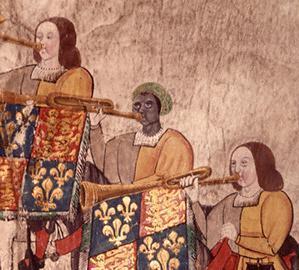
Kaufmann seeks to correct the absence of knowledge about Black people in Tudor England, exploring the stories of various Black Tudors, how they came to England, and how they were treated. Particularly, she corrects two assumptions: that the first people of African descent in England arrived with the 1948 Empire Windrush, and that the experience of those people once in England ‘was one of enslavement and racial discrimination’. The Black Tudors whose stories she charts instead act with agency and were involved in some of the defining events of the Tudor era. John Blanke successfully petitioned Henry VIII for higher wages as his trumpeter, Jacques Francis helped salvage the wreck of the Mary Rose, and Diego accompanied Francis Drake on his attempt to circumnavigate the globe. Many arrived as freemen, and integrated once in England, working, marrying, and being baptised. Through their stories Kaufmann provides an alternative picture of the Tudor ‘Age of Discovery’, perhaps most importantly that ‘slavery was not an inevitable result of the Anglo-African encounter’ but rather something that arose later out of specific historical circumstances.
Recommendation by Emilie Tenbroek
Eve Tuck and K. Wayne Yang, ‘Decolonization is not a metaphor’, Decolonization: Indigeneity, Education & Society 1 (2012), pp. 1-40.

Tuck and Yang explore the issues with the widespread adoption of ‘decolonizing’ initiatives in educational circles and scholarship, reminding the reader that decolonization should remain unsettling rather than simple. They suggest that this uptake in a purely educational or academic sense renders decolonization a ‘metaphor’, divorced from the actual process of decolonization that might involve such more difficult tasks as the redistribution of wealth, repatriation of Native lands, and integration. While not denying that decolonization of the mind is an important part of the decolonial project, they argue that decolonization-as-metaphor serves primarily to alleviate white settler guilt. The ‘conscientization’ of decolonization focusses on reconciliation, enabling settlers to alleviate their responsibility without giving up any privileges. It disappears the Native by disappearing the problem. Tuck and Yang term this phenomenon a ‘move to innocence’ and thus the erasure of coloniser guilt. Rather than this generalized metaphor that collapses the experiences of oppressed groups, they reinstate the importance of specificity: to them decolonization must always be incommensurable. Incommensurable with retaining the existing system, and incommensurable with other decolonial efforts in other settings.
Recommendation by Emilie Tenbroek
Angela Davis, Women, Race and Class (New York: Vintage, 1983)

Davis’ Women, Race and Class explores the intertwined histories of gender, race, and class in America, ranging from slavery to contemporary injustices as she wrote in 1981. She charts the histories of the abolitionist and women’s liberation movements, and the experiences of black women in both. Black women emerge from her narrative as excluded from both: discounted by the misogyny of key abolitionists and the racism and classism of the white women’s movements. She explores how white women were central to the oppression of black women, often engaged in pro-slavery activity, employing black women as exploited houseworkers, and advancing narratives of black male rapists while obscuring much higher assaults on black women by white men. Davis also explores avenues for liberation, suggesting that this must go beyond suffrage and encompass reproductive rights and renumeration for housework. One of the early intersectional analyses of race, class and gender, Davis uses this approach to expose the invisibilization of black women’s specific experiences under racism, patriarchy, and economic oppression.
Recommendation by Emilie Tenbroek
Gayatri Chakravorty Spivak, ‘Can the subaltern speak?’, in Rosalind Morris, Can the Subaltern Speak? Reflections on the History of an Idea (New York: Columbia University Press, 2010).
Spivak discusses the problems of theorising ‘subaltern’ subjects, exploring how the ‘third world’ is represented in Western discourse and postcolonial theory. She suggests that the Western intellectual is complicit in the Othering of the colonised or formerly colonised by treating them as an object of study, which in turn constructs the European, intellectual self as the studying subject. This upholds the colonial hierarchy of the Western Self with individuality and expression, against the colonised Other that is solely an object to be studied. For Spivak, Western intellectual activity is thus complicit in Western imperial domination: it continues the erasure of marginalised communities’ capacity to speak or write their own experiences, upholds the supremacy of the West, and allows the West to benefit economically from the silence of colonised peoples. She particularly focusses on women: how the woman colonized subject is ‘even more deeply in shadow’, doubly silenced by both patriarchy and imperialism and in effect ‘disappeared’. Spivak argues that to remain effective, postcolonial theory must recognise its ‘complicity in the muting’ of those it both speaks for and over.
Recommendation by Emilie Tenbroek


/prod01/prodbucket01/media/durham-university/departments-/history/77231.jpg)
